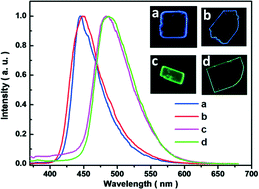Controlling the emergence of the desired polymorphic form in crystal growth is of importance for both understanding the phenomenon of polymorphism and practical applications, but remains a great challenge as well. Herein, two polymorphs of cyano substituted distyrylbenzene (CN-DSB) are obtained as the crystals grow from chlorobenzene solution (Form I, blue fluorescence) and from its vapor (Form II, green fluorescence). Single-crystal X-ray analysis for the two crystal forms shows unambiguous evidence that the distinctive feature of molecules in both crystal forms is their difference in torsion angles of peripheral phenyl segments. A computational study addresses that the controllable growth of polymorphs can be rationalized on the basis of structural relationships with torsion potential under different external conditions. Our demonstration of single-crystal growth by tuning subtle external conditions illustrates a controllable process of obtaining conformational polymorphs.

